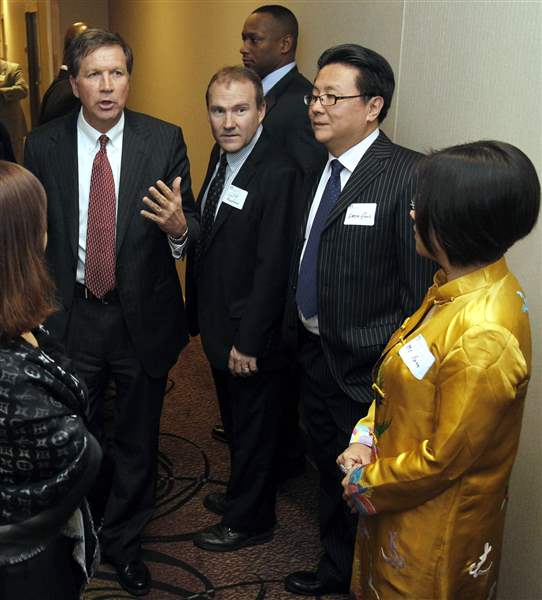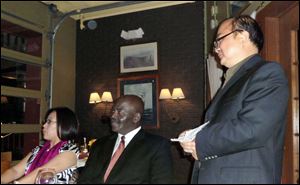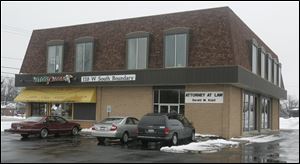
Deal in Toledo reflects Chinese business trend
Investors target smaller, low-cost U.S. markets
4/7/2011
Ms. Yuan, right, Mr. Guo, and Mr. Prephan were on hand for Gov. John Kasich's recent appearance in Perrysburg. Mr. Guo is a translator and deal broker; Mr. Prephan is a local businessman with ties to China.
The Blade/Lori King
Buy This Image

In October, Mayor Mike Bell, center, hosted Yuan Xiaohona, left, and Wu King Hung at Real Seafood at The Docks restaurant complex. The investors have since finalized their $2.15 million purchase of The Docks
His targets were elite groups of business leaders to alert them about the tremendous business opportunities in the People’s Republic.
Last year, it was Toledo Mayor Mike Bell who got the pitch from Simon Guo, the Chinese translator and deal broker whose friendship and association with Perrysburg businessman Scott Prephan ultimately led to the first major international transaction for the city of Toledo — the sale of The Docks restaurant complex for $2.15 million to Chinese investors.
“Simon is the key. He is the key to everything,” said Mr. Prephan — a former real estate developer and now real estate salesman whose friendship with Dean Monske, Mr. Bell’s former deputy mayor for external affairs, allowed him to connect the dots from Toledo to China and in the process collect a 5 percent commission.
The Docks deal is part of a burgeoning trend across America in which Chinese with high net worth — and the Chinese government through the China Investment Corp., a $300 billion sovereign wealth fund — are spending billions to invest in American businesses and buy U.S. real estate.
The two Chinese investors who purchased The Docks are now negotiating with city officials to buy and develop the stalled Marina District project in East Toledo.
Experts say Chinese companies and Chinese citizens with lots of cash, who are also encouraged by their own government to expand overseas, will invest in American property at an increasing rate.
Most are still buying in America’s mega commercial centers, but a few are now carving out pieces of the Rust Belt.
Ben Carlos Thypin, director of market analysis at Real Capital Analytics Inc., a research firm with offices in New York, said Chinese investments are edging into smaller markets such as Toledo and Milwaukee, rather than only investing in places such as New York and Chicago.
Lower-cost targets
“Over the past couple years, most if not all Chinese investment has been going to those major markets,” Mr. Thypin said. “In the past year we saw one in Milwaukee. What’s happening in Toledo is a continuation of that trend.”
He said part of Toledo’s appeal to Chinese investors is a much lower cost.
“They can buy a lot of land and build a lot more for their money as long as they are comfortable with the place,” Mr. Thypin said. “It will serve as some kind of base for a long period rather than a financial investment … I imagine they are doing their homework and that is why they are going to Toledo, because it is so cheap and they can afford for this to take a long time.”

Ms. Yuan, right, Mr. Guo, and Mr. Prephan were on hand for Gov. John Kasich's recent appearance in Perrysburg. Mr. Guo is a translator and deal broker; Mr. Prephan is a local businessman with ties to China.
Many questions remain unanswered, however, including precisely how the two investors — Wu Kin Hung and Yuan Xiaohona — made their millions and what they intend to do with the Marina District, which has long been heralded as a key component to the near-downtown Toledo redevelopment.
Even their identities remain a question.
Initially, city officials refused to divulge the names of the potential Chinese investors. A Blade reporter obtained Mr. Wu’s name from the secretary of one of the businessmen who accompanied Mr. Bell to China in September on a mission to market the city.
The Blade obtained Ms. Yuan’s name in February from her Toledo attorney through a city official, but that same attorney, David Squillante, told the newspaper last week that she signed her name on documents as Siu Hung Yuen when she was recently in Toledo to meet with city officials. He wouldn’t explain the discrepancy.
Ms. Yuan has said she is part of a “shareholder company” and her business has been primarily in commercial and residential real estate, chiefly in the Chinese city of Shenzhen, but details on the Chinese investors’ backgrounds is in short supply.
Neither Ms. Yuan, Mr. Guo, nor Mr. Wu could be reached for comment for this story.
Hard to track
Chinese investors have a practice of investing through conduits a lot of the time, which makes their investments opaque and difficult to track, said Mr. Thypin, the New York market analyst.
“There is a problem dealing with Chinese companies here or there. You do not know who is the guy behind the guy, behind the guy,” Mr. Thypin said.
“As their investments spread to places that are less used to foreign investments, perhaps there will be more scrutiny to these firms, who they are, and whether they are coming from the government or the private [sector].”
China’s investment in the United States was $448 million in 2003 and that figure increased to more than $2.3 billion by 2009. Chinese investors also have bought foreclosed housing and sought stakes in automobile and energy companies.
Part of the investments come from the China Investment Corp., an investment institution established as a wholly state-owned company under the Company Law of the People’s Republic of China and headquartered in Beijing.
Last month, Ms. Yuan told The Blade that the money to purchase The Docks came from totally private sources.

The two Chinese investors associated with Dashing Pacific Group are negotiating with city officials to purchase the Marina District. It's unclear what their plans are for the East Toledo project.
Even with Chinese investment in the United States growing exponentially, how is it that a mayor with a background in firefighting and a real estate salesman with a checkered development background and an office above a pizzeria, could pull off an international investment deal with Chinese investors who acknowledge they had never heard of Toledo before last year?
Mayor Bell, the city’s former fire chief whose popularity and charisma helped get him elected, acknowledged that he was able to parlay those skills into “forming relationships” with Chinese officials who, through Mr. Guo and Mr. Prephan, led the two Chinese investors to Toledo.
The relationship has developed so much so that Mr. Bell next month has been invited to speak briefly in China at the wedding of Mr. Wu’s son, Jimmy Wu.
And the mayor credits old fashioned glad-handing.
“The key to the reason this is working so well is we keep establishing relationships,” Mr. Bell said. “We are doing what door-to-door salesmen used to do. We are trying to get people to take a look at cities that are midlevel, not just places like Chicago, because we believe our quality-of-life is high and we have less complications than a big city.”
The mayor said he is not concerned that he does not know details of Mr. Wu’s and Ms. Yuan’s business history or from where their money comes.
“I know the same amount that I know about where Chrysler gets its money or where any other foreign company gets its money,” he said. “I am doing the appropriate due diligence we would do for any company and we are trying to do the best we can for the city of Toledo.”
The Prephan link
Mr. Bell said he also is not concerned about Mr. Prephan’s past business and legal problems.
Mr. Prephan, who is the local contact for Dashing Pacific Group — the company set up by the Chinese investors to buy the Docks — has become an unlikely figurehead shepherding the relationship between the city of Toledo and Chinese investors.
The Bowsher High School and Bowling Green State University graduate shares office space above a pizzeria on West South Boundary Street in Perrysburg.
A certified public accountant, he once co-owned the mall in Bowling Green and has developed hundreds of condominiums and homes in northwest Ohio and southeast Michigan.
But since the national and local real estate market collapse in late 2007, Mr. Prephan has had more than $2.3 million in court judgments levied against him and real estate partnerships he’s involved with, had property in Waterville put into receivership, and is in danger of losing part of a major waterfront development on Sandusky Bay in Ottawa County.
Partly because of those financial troubles, he said he has focused more acutely on business opportunities in China.
Since first leading Mr. Bell, Mr. Monske, and a local business delegation to China in September, Mr. Prephan continues to promote the city’s desire to attract Chinese investment.
Mr. Prephan was to be paid $107,500 in commission for the $2.15 million Docks’ sale that closed on March 18, but creditors from failed business loans have filed a complaint in Wood County Common Pleas Court in an attempt to keep him from collecting that cash.
Mr. Bell said Mr. Prephan has been valuable to the city and his civil legal problems have not been a concern.
“The investors have a comfort level with him,” Mr. Bell said. “I would not have met any of these individuals if we hadn’t gone to China … and they needed a contact and they were comfortable with Scott and he has been in the business for a long time, so this is not someone who is new on the scene.”
Mr. Prephan has been arranging meetings between Mr. Bell and additional Chinese investors interested in deals within the city for when the mayor returns to China sometime next month.

Scott Prephan, the local contact for the Chinese investors, has office space above a pizzeria in Perrysburg. Partly because of financial troubles in the United States, he has focused his dealings on China.
The Perrysburg businessman began making trips to China about six or seven years ago after attending seminars locally about doing business there.
“I went to China because my initial goal was development and building opportunities,” Mr. Prephan said. “There has been a creation of a new middle class in China that never existed before with incredible buying power.”
He said much of his success in luring Chinese investors to Toledo has come from his relationship with Mr. Guo, a prominent deal broker between Chinese and American businessmen who once translated for former Secretary of State Henry Kissinger while in China.
“He is by far my strongest connection to China,” Mr. Prephan said. “The flood gates really opened when the mayor and Dean [Monske] went over there and nurtured some of foundations we had laid.”
Early last year, Mr. Prephan and Mr. Guo went to a chief executive officers’ conference in New York, where Mr. Prephan was introduced to Mr. Wu. That meeting included about 43 chief executive officers from China who were visiting the United States to learn about investment opportunities.
“What I did was — and this is on a continuous basis — the most important thing about doing business in China is to develop the right relationships,” Mr. Prephan said. “Simon knows both cultures very well and he is able to transcend the difference between the two.”
Elsewhere
Toledo’s effort to attract international investment is not unique.
Milwaukee Mayor Tom Barrett first hosted a delegation of elected officials from Ningbo, China, in 2006 — several months after his October, 2005, trade mission to the country.
Martha Brown, Milwaukee deputy commissioner of development, said a Beijing-based company called the Toward Group in 2008 purchased for $6 million the vacant Northridge mall in northwestern Milwaukee, with the intent of opening a Chinese-style mega mall.
The company reportedly cited the low cost of doing business in Milwaukee as part of the decision to invest there.
So far, the mall remains vacant, Ms. Brown said.
Robert Lawrence, professor of trade policy at Harvard University’s Kennedy School of Government, said the emergence of a huge middle class in China has generated an internal demand for investment.
“China has a stunningly high savings rate — almost half of its gross domestic product — and for the most part they have been investing their savings at home, but they have also been accumulating high amounts of foreign exchange revenues because they are buying high amounts of U.S. government debt, but in addition they are searching around for profitable places to invest their savings,” Mr. Lawrence said. “Given the volume of investments they are making, they have a voracious need to find high returns … within China itself, the returns are rather low because there has been so much investment.”
Mr. Lawrence, co-author of the forthcoming book Rising Tide: Is Growth in Emerging Markets Good for the United States? said Chinese investments in the United States will continue.
“From one vantage point, real estate is the most unmovable asset you can have, so in a sense, why would we be against it?” he added. “Why should we be concerned if our real estate is being bought? It is [another] thing when they buy out intellectual properties, or factories — ways that hurt us.”
Contact Ignazio Messina at:
imessina@theblade.com
or 419-724-6171.